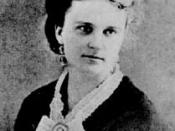Irony in Short Fiction
A man wins the lottery and dies the next day. Another man buys a brand new car and totals it on his way home. A woman shoots an "intruder" only to find out, once the lights are turned on, that her beloved husband had come home early from a lengthy business trip to surprise her. What do all these tragedies have in common? They are all intertwined with a cruel, twist of events known as irony.
Kate Chopin, an American short story writer, made much literary use of irony. Many of her short stories started out well enough but ended quite dramatically, and often tragically. They leave the reader quite stupefied, wondering whether to laugh at the obvious, ironic twist in the story, or to cry with the victim in the story whose life was so dramatically affected by the horrible twist. A wonderful example of Chopin's love of irony is best depicted in a couple of her short stories, Desiree's Baby and The Story of an Hour.
Desiree's Baby is a very short story that one would not expect to contain so much material in such a short period from beginning to end. However, the story is filled with twists, turns, and upsets, giving a brand new perspective to the meaning of irony. The story begins rather slow with no hint of any drama in the future. Desiree is a young woman, abandoned as a child, who has had the good fortune of being loved by a well-off young man, Armand. The first sign of trouble in the story appears as Mrs. Valamonde, the lady who raised Desiree from a child, is visiting Desiree and her new baby. The reader can sense a feeling of confusion and dread exuding from Mrs. Valamonde as she...


